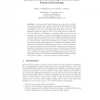Free Online Productivity Tools
i2Speak
i2Symbol
i2OCR
iTex2Img
iWeb2Print
iWeb2Shot
i2Type
iPdf2Split
iPdf2Merge
i2Bopomofo
i2Arabic
i2Style
i2Image
i2PDF
iLatex2Rtf
Sci2ools
130
click to vote
ATAL
2005
Springer
2005
Springer
Informed Deliberation During Norm-Governed Practical Reasoning
A norm-governed agent takes social norms into account in its practical reasoning. Such norms characterise its role within a specific organisational context. By adopting a role, the agent commits to fulfil and adhere to the social norms associated with that role. These commitments require the agent to act in a way that does not violate any of its prohibitions or obligations. In adopting different sets of norms, an agent may experience conflicts between these norms as well as inconsistencies between possible actions for fulfilling its obligations and its currently adopted set of norms. In order to resolve such problems, it must be informed about conflicts and inconsistencies. The NoA architecture for norm-governed agents implements a computationally efficient mechanism for identifying and indicating such problems – possible candidates for action are assigned a specific label that contains cross-referenced information of actions and norms. As actions are indicated as problematic ...
Related Content
| Added | 26 Jun 2010 |
| Updated | 26 Jun 2010 |
| Type | Conference |
| Year | 2005 |
| Where | ATAL |
| Authors | Martin J. Kollingbaum, Timothy J. Norman |
Comments (0)

